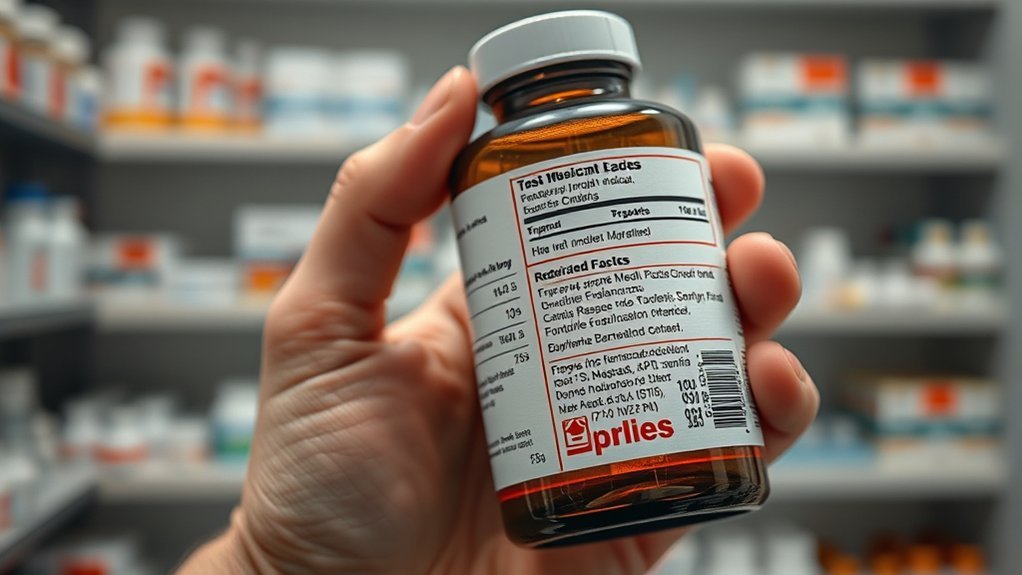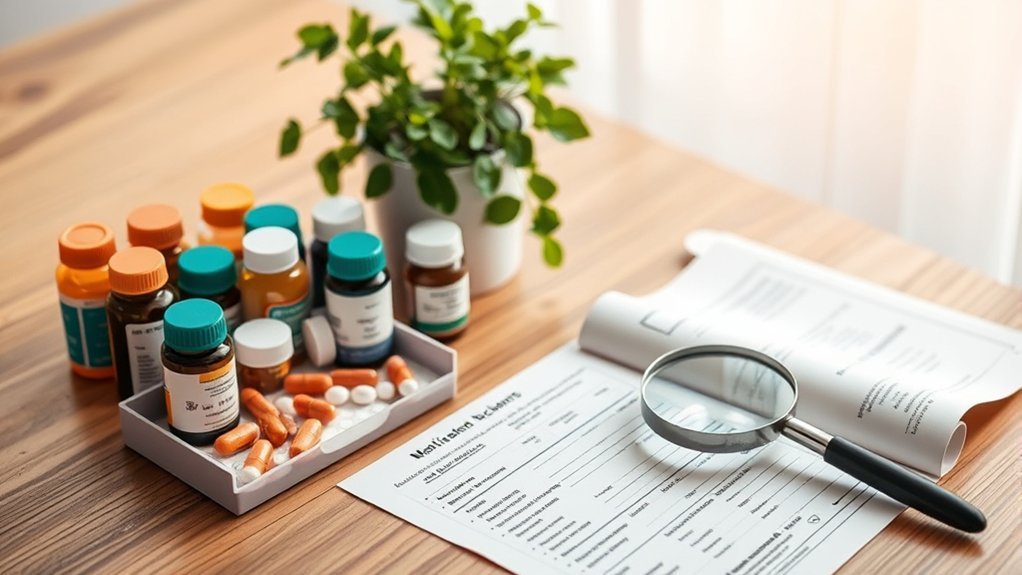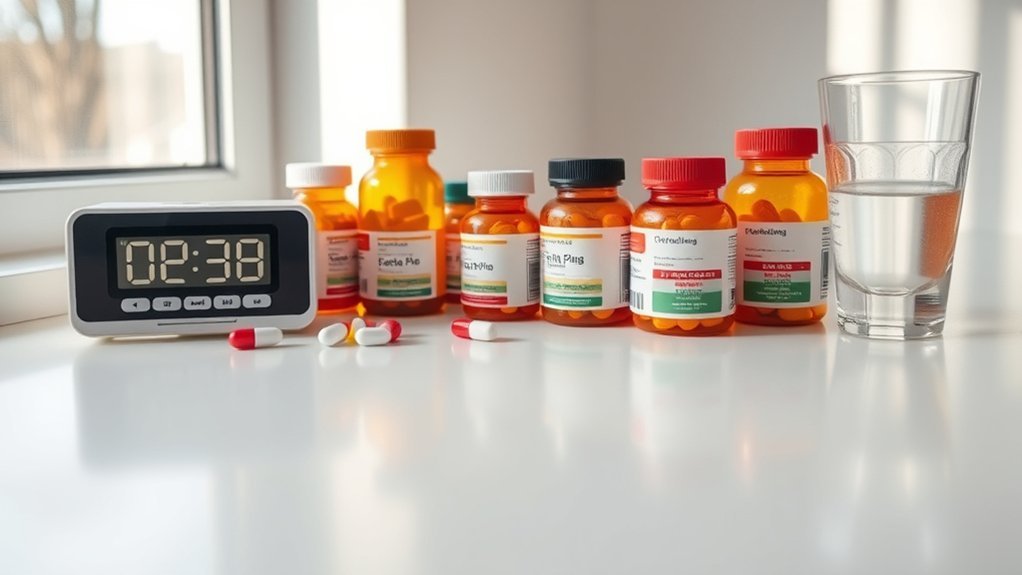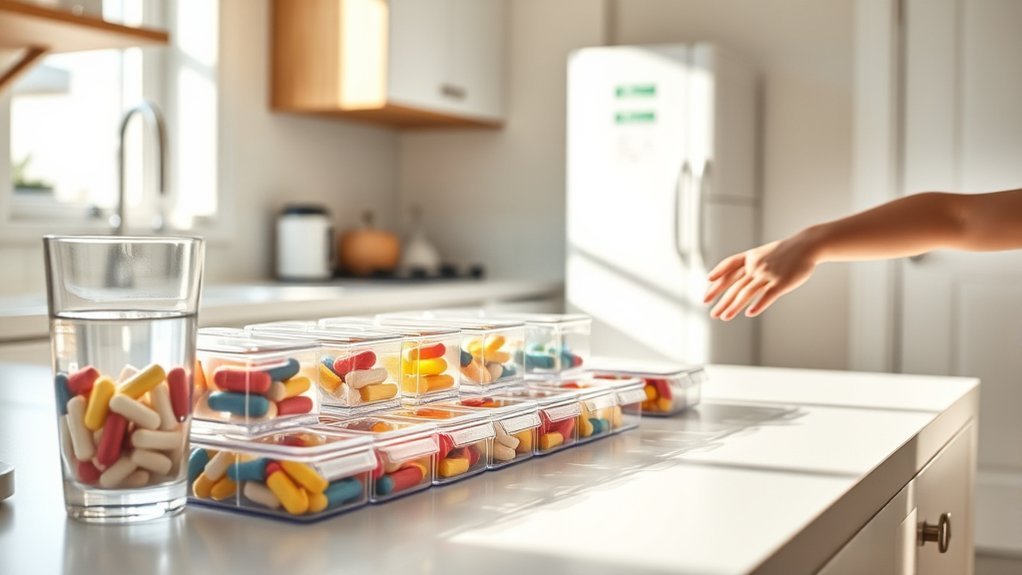When it comes to managing your medications, ensuring safety is essential. You should always verify that the medication name matches your prescription, and follow dosage instructions carefully. It’s also important to be aware of potential side effects and to consult a healthcare professional when needed. By keeping an updated list of your medications, you can prevent errors and interactions. But what’s the best way to manage these complexities effectively?
Understanding Medication Labels

How can you guarantee you’re taking your medications safely and effectively? Understanding medication labels is vital.
Start by checking the medication name, which should match your prescription. Look for the dosage instructions—this tells you how much and how often to take it.
Pay attention to the expiration date; never take medications past this date. Review any warnings about potential side effects, and consult your healthcare provider if you have concerns.
Also, note the active ingredients, especially if you’re taking multiple medications, to avoid duplication.
Finally, keep an eye out for storage instructions, as improper storage can affect the medication’s efficacy.
Recognizing Drug Interactions

While you may be diligent about taking your medications as prescribed, it’s equally important to recognize how different drugs can interact with each other.
Drug interactions can lead to side effects, reduced efficacy, or even harmful reactions. Here are four key points to help you identify potential interactions:
- Consult Your Healthcare Provider: Always discuss your full medication list with your doctor or pharmacist.
- Read Labels Carefully: Check for warnings about drug interactions on medication labels.
- Use One Pharmacy: This allows your pharmacist to monitor all your prescriptions for potential interactions.
- Stay Informed: Research interactions using reliable medical resources or apps specifically designed for this purpose.
The Importance of Dosage Awareness

Why is it essential to pay attention to medication dosages? Proper dosage guarantees that you receive the intended therapeutic effects while minimizing the risk of side effects or toxicity.
Each medication has a specific dosage range determined through rigorous clinical trials, and straying from this can lead to serious health consequences. For instance, taking too little may not treat your condition effectively, while taking too much can overwhelm your body’s systems.
Additionally, factors like age, weight, and existing health conditions can influence how your body processes medication. By being aware of the prescribed dosage and adhering to it, you actively participate in your treatment plan, enhancing safety and effectiveness.
Always double-check labels and instructions to prevent dosage errors.
Consulting Healthcare Professionals
When it comes to managing your medications, consulting healthcare professionals is essential for ensuring safety and efficacy. They can provide invaluable insights and help you navigate your treatment plan.
Here are four key reasons to consult them regularly:
- Expert Guidance: Healthcare professionals can tailor medication plans to your specific health needs.
- Drug Interactions: They can identify potential interactions with other medications or supplements you’re taking.
- Side Effects Management: Professionals can help you understand and manage possible side effects, ensuring your comfort.
- Medication Adjustment: They’re equipped to adjust dosages or switch medications if your condition changes or if you experience adverse effects.
Keeping an Updated Medication List
Maintaining an updated medication list is essential for your health management. It helps prevent medication errors, guarantees safe prescribing, and enhances communication with healthcare providers. Regularly reviewing your list allows you to track changes and identify potential drug interactions.
Here’s a simple way to organize your medication information:
| Medication Name | Dosage | Purpose |
|---|---|---|
| Lisinopril | 10 mg | Hypertension |
| Metformin | 500 mg | Type 2 Diabetes |
| Atorvastatin | 20 mg | Cholesterol Control |
Keep this list handy during doctor visits or emergencies. Update it whenever you start or stop a medication. By doing so, you’re taking an active role in your healthcare and guaranteeing your safety.
Frequently Asked Questions
Can I Take Expired Medications Safely?
You shouldn’t take expired medications safely. They may lose potency or become harmful. Consult your healthcare provider for alternatives and dispose of expired medications properly to guarantee your health and safety.
How Should I Store My Medications?
To store your medications properly, keep them in a cool, dry place away from direct sunlight. Isn’t it essential to maintain their effectiveness? Always check expiration dates and secure them out of children’s reach.
What Should I Do With Unused Medications?
You should dispose of unused medications properly by following local guidelines. Return them to drug take-back programs, or if unavailable, mix them with an unpalatable substance, seal in a container, and throw them away.
Are Over-The-Counter Drugs Always Safe?
Over-the-counter drugs aren’t always safe. They can interact with prescription medications or underlying health conditions. Always read labels, consult with a healthcare professional, and be cautious about dosage to guarantee your safety and well-being.
How Can I Identify Counterfeit Medications?
To identify counterfeit medications, check the packaging for misspellings, unusual colors, or inconsistencies. Verify the manufacturer’s details online, and consult a pharmacist if you’re unsure about the medication’s authenticity before using it.
Conclusion
In the domain of medication management, think of your prescriptions as a carefully balanced recipe. Just as a pinch too much salt can ruin a dish, incorrect dosages or neglected interactions can jeopardize your health. By diligently checking labels, staying informed about potential side effects, and consulting your healthcare provider, you guarantee your treatment is both effective and safe. Remember, a well-prepared recipe leads to a successful meal—similarly, your proactive approach to medications leads to better health outcomes.
